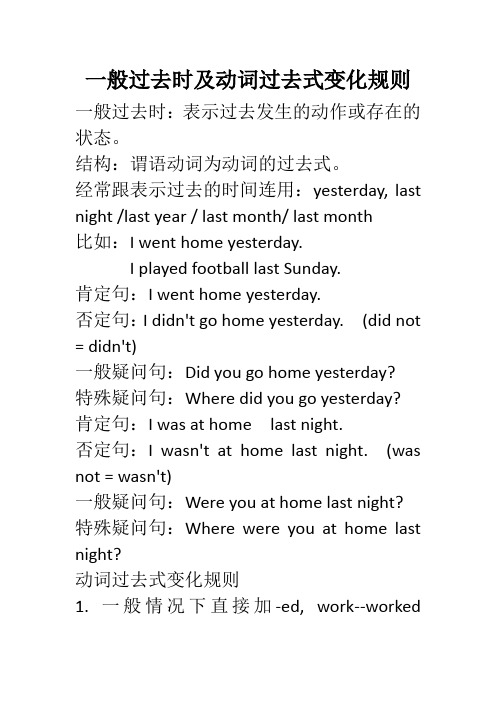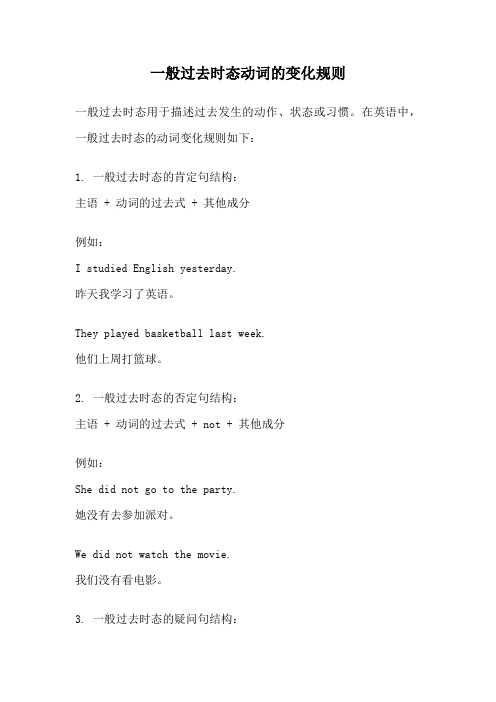一般过去式动词及句型变化规律
一般过去时动词的变化规则

一般过去时(一)动词过去式的构成:(1)规则变化:(2)不规则变化:①过去式不改变:这一类不规则变化的动词都是以-t或者以-d结尾的。
cost—cost cut—cut hit—hit hurt—hurt let—let put—put read—read②有字母组合-ee或者-ll的动词。
省略原形动词中两个相同的字母中的其中一个,然后在词尾叫-t。
keep—kept sleep—slept sweep—swept feel—felt smell—smelt spell—spelt③以字母-d或者-t结尾、中间的字母组合多数是-ee或者-oo的动词,省略原形动词中两个相同字母中的其中一个。
meet—met shoot—shot④把原形动词的最后一个字母-d改成-t。
send—sent lend—lent rend—rent spend—spent build—built⑤动词原形中有-ow,-aw这些字母组合的,过去式中把这些组合改成-ew。
blow—blew grow—grew know—knew throw—threw draw—drew⑥动词原形中有字母组合-in(m)或者-ing或者-ink,过去式中把字母-i变成-a。
begin—began sing—sang ring—rang drink—drank swim—swam⑦不规则动词以-m,-n结尾的,过去式在原形动词词尾加-t或者-d。
mean—meant learn—learnt dream—dream hear—heard⑧过去式有-ought, -aught的。
think—thought buy—bought bring—brought teach—taught catch—caught⑨动词原形是以元音字母-i加辅音字母加不发音的-e结尾的,一般是在过去式中将字母i改成-o。
ride—rode write—wrote drive—drove⑩动词原形中有-ea或者-ee或者-oo的字母组合的不规则动词,动词过去式是将这个字母组合改成-o,然后在词尾加-e。
(完整)一般过去时_动词过去式变化规则

一般过去时动词过去式变化规则:1.一般在动词末尾加-ed,如:pull-pulled,cook-cooked2.结尾是e加d,如:taste—tasted3.末尾只有一个元音字母和一个辅音字母的重读闭音节,应双写末尾的辅音字母,再加—ed,如:stop-stopped4.以“辅音字母+y”结尾的,变y为i,再加-ed,如:study—studied5.不规则动词过去式:am,is-was are—were, do—did,see—saw, say—saidgive-gave, get—got, go-went, come-came, have-had, eat—ate, take-took, run-ran, sing—sang,put—put, make—made,read—read,write-wrote, draw—drew,drink—drank, fly-flew, ride—rode, speak-spoke, sweep-swept, b uy—boughtswim-swam, sit—sat bring——brought can—could cut-cut become—became begin —began draw—drew feel—felt find—foundforget—forgot hear—heard keep—kept know—knewlearn-learnt(learned)leave-left let-let lose—lostmeet—met read-read sleep—slept speak—spoke take-tookteach-taught tell-told write-wrote wake-woke过去式go ____ _____ _____ enjoy ______ _______ ________buy _____ _______ ______ eat_____ ______ _______get ______ ______ ______ walk ______ ______ ______take______ _____ ______ dance______ ______ _______write _____ _____ ______ run______ _______ _______swim_____ _______ _______ find _______ _______ _______begin______ ______ ______ eat ______ _______ ______play ______ ______ _______ study ______ ______ ________用所给动词的适当形式填空1。
小学一般过去时及动词过去式变化规则及不规则形式

一般过去时及动词过去式变化规则一般过去时:表示过去发生的动作或存在的状态。
结构:谓语动词为动词的过去式。
经常跟表示过去的时间连用:yesterday, last night /last year / last month/ last month比如:I went home yesterday.I played football last Sunday.肯定句:I went home yesterday.否定句:I didn't go home yesterday. (did not = didn't)一般疑问句:Did you go home yesterday?特殊疑问句:Where did you go yesterday?肯定句:I was at home last night.否定句:I wasn't at home last night. (was not = wasn't)一般疑问句:Were you at home last night?特殊疑问句:Where were you at home last night?动词过去式变化规则1. 一般情况下直接加-ed, work--workedwalk-- walked help--helped play--played2. 以不发音的字母e结尾的动词,加d, dance--danced like-liked3. 以重读闭音节结尾,而且结尾只有一个辅音字母,双写这个辅音字母,再加ed, plan--planned, stop--stopped, shop--shopped4. 以辅音字母加y结尾的动词,把y变成i,再加ed, try-- tried, study--studied5. 不规则动词的变化:take--took, have--had, see--saw, draw--drew, come--came, give--gave, sit--sat, sing--sang, swim--swam, drink--drank, run--ran, put --put read--read, buy--bought, am/is--was are--were , do --did, go --went, make---made。
一般过去时及动词的过去式变化规则

一般过去时及动词的过去式变化规则一般过去时1)、表示过去发生的动作或出现的状态,用动词的过去式来表达,如:I was at the library yesterday afternoon.Tom studied hard and did well in the final exam last year.2)、动词的过去式分为规则动词和不规则动词两种:规则动词的过去式:①一般情况下在动词原形后直接加-ed。
wanted,played②以不发音的字母e结尾的动词,直接加-d。
hoped,lived③重读闭音节单词如果末尾只有一个辅音字母需双写最后一个辅音字母,再加-ed stopped④以辅音字母+y结尾的动词变y为i,再加-ed。
studied,worried以元音字母+y结尾的动词,直接加-ed. played, enjoyed规则动词过去式的读音也有规律可循。
请记住:清后[t],元浊[d],[t] [d]之后读[id]。
①清辅音后,ed要读[t]。
worked,finished②元音或浊辅音后,ed要读[d]。
lived,called③[t]或[d]后,ed读[id]。
started,needed不规则动词有其自己的变化形式,只能分别记忆。
1. go -went2.take-took3. have-had4.buy-bought5. eat-ate6.see-saw7. hang-hung(悬挂)8.meet-met9. win-won(赢得) 10.sleep-slept 11. put-put e-came13. wake-woke(醒)14.read-read 15let-let (详见课本《不规则动词表》)3)句式及其变化:a. be动词过去式的句式:否定句是在was/were后面加not,was not (wasn't)/were not (weren't)。
一般疑问句是把was / were提前并放到句首,要求首字母要大写b. 实义动词过去式的句式:①肯定式:主语+动词过去式+其它。
一般过去时动词变化规则

一般过去时动词变化规则一般过去时是英语中最常用的时态之一,用来表示过去发生的动作或状态。
在使用一般过去时时,动词的变化规则是非常重要的。
下面将介绍一般过去时动词的变化规则及其用法。
一般过去时的动词变化规则:1. 对于大多数动词,一般过去时的构成是在动词原形的基础上加上-ed结尾。
例如:work → worked,play → played,study→ studied等。
2. 对于以不发音的-e结尾的动词,只需要加上-d结尾。
例如:live → lived,love → loved,hate → hated等。
3. 对于以辅音字母+y结尾的动词,变化时将y变为i,再加上-ed结尾。
例如:carry → carried,study → studied,try → tried等。
4. 对于以重读闭音节结尾的单词,要双写最后一个辅音字母,再加上-ed结尾。
例如:stop → stopped,plan → planned,refer → referr ed等。
5. 不规则动词的过去式需要通过记忆来掌握,例如:go → went,eat → ate,drink → drank等。
一般过去时的用法:1. 表示过去的动作或状态。
例如:She worked in a bank last year.(她去年在一家银行工作。
)2. 表示过去的习惯性动作。
例如:He always played football after school.(他放学后总是踢足球。
)3. 表示过去的真实条件。
例如:If I had time, I would go with you.(如果我有时间,我会和你一起去。
)总结:一般过去时的动词变化规则是非常重要的,掌握好这些规则可以帮助我们正确地使用一般过去时。
除了掌握动词的变化规则外,我们还需要注意一般过去时的用法,这样才能在实际运用中做到恰如其分。
希望通过本文的介绍,读者们能够更好地掌握一般过去时的动词变化规则及其用法。
一般过去时的变化规则

一般过去时的变化规则一般过去时是英语中最基本的时态之一,用来表示过去发生的动作或状态。
在构成一般过去时的句子时,动词需要进行相应的变化。
下面将详细介绍一般过去时的变化规则。
1. 一般动词的变化规则在一般过去时中,一般动词的变化规则是在动词原形的基础上加上了-ed结尾。
例如:- work -> worked- play -> played- study -> studied在一些特殊情况下,动词的变化形式可能会有所不同,比如以不规则动词的形式变化。
例如:- go -> went- eat -> ate- have -> had2. be动词的变化规则be动词在一般过去时中的变化规则是: - I/he/she/it was- You/we/they were例如:- I was at home yesterday.- He was happy last night.- We were in the park this morning.3. 动词短语的变化规则在一般过去时中,动词短语的变化规则是将助动词did放在句子中,然后将动词原形放在did后面。
例如:- She did her homework yesterday.- They did their chores last weekend.- We did our best in the competition.4. 特殊疑问句和否定句的变化规则在一般过去时中,特殊疑问句和否定句的变化规则是将助动词did放在句子中,然后将主语放在did后面,再接动词原形。
例如: - Did you go to the party last night?- Did they finish their project on time?- I didn't see him at the meeting.5. 时间状语的使用在一般过去时中,时间状语通常用来表示动作发生的具体时间。
一般过去时的规则和不规则变化

如:
study —— studied cry —— cried
பைடு நூலகம்
carry —— carried
worry —— worried
4.重读闭音节结尾的动词末尾只有一个 辅音字母,需双写这个辅音再加-ed.
stop ___ stopped shop ___ stopped
规则动词过去式记忆口诀
过去式构成有规律 一般词尾加-ed 如词尾有个e,直接加-d就可 辅音字母y结尾,变y为i加-ed 辅音重闭结尾,双写之后加-ed
不规则动词的过去式
(1)动词原形和过去式一样 let——let read——read cost——cost put——put cut——cut hurt——hurt
(2)遇见i改为a swam sang began sat gave drank
swim sing begin sit give drink
(3)过去式以ought和aught结尾的单词 brought bought thought caught taught
bring buy think catch teach
一般过去时的规则动词和不规则动词
旅10
规则动词
1.一般的动词:直接加-ed
如:watch——watched help——helped work——worked
2.以字母e结尾的单词:加-d
如:love——loved live——lived arrive——arrived
3.以辅音字母y结尾的动词:变y为i再加-ed
(4)中间去e末尾加t
feel keep sleep
一般过去时态动词的变化规则

一般过去时态动词的变化规则一般过去时态用于描述过去发生的动作、状态或习惯。
在英语中,一般过去时态的动词变化规则如下:1. 一般过去时态的肯定句结构:主语 + 动词的过去式 + 其他成分例如:I studied English yesterday.昨天我学习了英语。
They played basketball last week.他们上周打篮球。
2. 一般过去时态的否定句结构:主语 + 动词的过去式 + not + 其他成分例如:She did not go to the party.她没有去参加派对。
We did not watch the movie.我们没有看电影。
3. 一般过去时态的疑问句结构:Did + 主语 + 动词原形 + 其他成分?例如:Did you finish your homework?你完成作业了吗?Did they visit their grandparents?他们去拜访祖父母了吗?4. 动词的过去式变化规则:一般来说,动词的过去式可以通过在动词原形后面加上-ed来构成。
但是也有一些不规则动词需要记忆其过去式形式。
例如:work - worked工作 - 工作过play - played玩 - 玩过study - studied学习 - 学习过go - went去 - 去过5. 一般过去时态的时间状语:一般过去时态常常和表示过去的时间状语词连用,以明确动作发生的时间。
例如:yesterday昨天last week上周two hours ago两小时前in 1990在1990年总结起来,一般过去时态的动词变化规则包括了动词的过去式构成以及肯定句、否定句和疑问句的结构。
在使用一般过去时态时,我们需要根据句子结构和上下文来确定动词的过去式形式,同时注意使用适当的时间状语词来明确动作发生的时间。
通过掌握这些规则,我们可以更准确地描述过去发生的事情,使我们的句子更加流利和地道。
- 1、下载文档前请自行甄别文档内容的完整性,平台不提供额外的编辑、内容补充、找答案等附加服务。
- 2、"仅部分预览"的文档,不可在线预览部分如存在完整性等问题,可反馈申请退款(可完整预览的文档不适用该条件!)。
- 3、如文档侵犯您的权益,请联系客服反馈,我们会尽快为您处理(人工客服工作时间:9:00-18:30)。
一般过去式动词及句型变化规律Revised on November 25, 2020动词过去式的变化规则一、规则动词的过去式1.动词原形+-ed(大部分动词)want—wanted work—worked need—needed clean—cleaned wash—washed play—played spell—spelled help--helped2.以不发音的e结尾的在词尾加-dlike—liked live—lived use—used move—moved hope—hoped dance—danced3.以一个元音字母(A/E/I/O/U)加一个辅音字母结尾的重读闭音节动词,先双写结尾的辅音字母,再加-edstop—stopped, trip—tripped4.以辅音字母加y结尾的动词,先把y变成i,再加-edstudy—studied carry—carried hurry—hurried marry—married copy—copied cry—cried二、不规则动词的过去式1. 以t结尾的词,过去式与原形相同。
put—put let—let cut—cut beat—beat2. 以d结尾的词,把d变成t。
build—built lend—lent send—sent spend—spent3. 以n结尾的词,在词后加t。
mean—meant burn—burnt learn—learnt4. 以ow / aw结尾的词,把ow / aw变成ew。
blow—blew draw—drew know—knew grow—grew 5. 含有双写字母的词,将双写改为单写,在词尾加t。
keep—kept sleep—slept feel—felt smell—smelt6. 含有元音字母o / i的词,将o / i变成a。
sing—sang give—gave sit—sat drink—drank 我们目前已学动词的过去式什么时候用一般过去时呢1.表示在过去某一时间内发生的动作或情况◆①带有确定的过去时间状语morning five daysyesterday afternoon one week agoevening three minutesthe day before yesterday three hoursyear morninglast month one dayday the other daythat year 其他 when I was youngmorning just noweg. I went to school on foot yesterday.I finished my homework last week.◆②没有确定的过去时间状语时eg. I thought you were ill. 我原以为你生病了(这句话说明在说话之前我以为你病了,但是现在我知道你没病)2.表示过去一段时间内经常或反复发生的动作(常与always,never,often 等频度副词连用)eg. Peter always carried an umbrella. Peter 常常带着伞I never drank wine. 我从不喝酒一般过去时的句型肯定句:主语+行为动词过去式/be动词过去式eg : We played football yesterday.I was happy last night.否定句:did not / didn’t + 行为动词原型Was not / wasn’t + 其他Were not / weren’t + 其他eg:I didn’t finish my homework.I wasn’t happy last night.We weren’t finish our team work.一般疑问句:Did + 主语 + 行为动词原型Was /Were + 主语 + 其他成分eg: -----Did you go shopping yesterday-----Yes, I did. / No ,I didn’t.Was she 15 years old last year特殊疑问句;特殊疑问词 + did + 主语 + 行为动词原型特殊疑问词was / were + 主语 + 其他成分eg: Where did you go on vacationWhen and where were you born一般过去时练习题一、单项选择:从下列各题后所给的四个选项中选择最佳答案填空。
(10)( )1. My father______ill yesterday.A. isn't B. aren't C. wasn't D. weren't( )2.______your parents at home last week﹖A. Is B. Was C. Are D. Were( )3. The twins______in Dalian last year. They______here now.A. are; were B. were; are C. was; are D. were; was( )4.______your father at work the day_____yesterday(前天)﹖A. Was; before B. Is; before C. Was; after D. Is; after ( )5.—Who was on duty last Friday﹖—______.A. I am B. I was C. Yes, I was D. No, I wasn't二、请用正确动词形式填空。
(10)1. I _________ (have) an exciting party last weekend.2. _________ she _________(practice) her guitar yesterday No, she_________.3. What ________ Tom ________ (do) on Saturday eveningHe ________(watch) TV and __________(read) an interesting book.4. They all _________(go) to the mountains yesterday morning.5. She _________(not visit) her aunt last weekend.She ________ (stay) at home and _________(do) some cleaning.三、翻译下列句子(20)1. 我过了一个忙碌但却刺激的周末。
I _________ _________ __________ __________ exciting weekend.2. Jenny喜欢看书。
昨晚她看了一本英语书。
Jenny likes _________ __________. She _________ an English book last night.3. Emma每天都看电视。
可是昨天他没有看。
Emma__________ TV every day. But he _________ ________ ________yesterday.4. 上周六他们做什么了他们做作业和购物了。
What ________ they _________ _________ SaturdayThey _________ __________ homework and _________ __________.5. 今天早上方方得做饭,因为他父亲不在家。
This morning Fangfang ____ ____ ____ ____ because his father _____ _____ ____ yesterday.四、改写句子:(20)1、Lucy did her homework at home.(改否定句)Lucy ________ _______ herhomework at home.2、He found some meat in the fridge(冰箱).(变一般疑问句)___________ he __________ ___________ meat in the fridge3、There was some orange in the cup.(变一般疑问句)_______ there _______orange in the cup4. Frank read an interesting book about history. (一般疑问句)_______ Frank _______ an interesting book about history5. Why not go out for a walk (同义句) _______ ________ ________ out for awalk五、改错题(20)1.How is Jane yesterday _____________________2.He go to school by bus last week. ____________________________3.He often goes home at 6:00 last month. ____________________________ 4.I can fly kites seven years ago. ______________________________5.Did you saw him just now. ____________________________________ 六、完形填空(10)Tom did not like doing his homework,because he liked to do some 1 things after school.And his teacher always 2 a lot of mistakes in his homework.Then one day,his maths teacher 3 at Tom’s homework and saw that he got all his answers right.He was very 4 and surprised(惊奇).The next morning before class,he called Tom 5 his desk and 6 to him,“You got all yourhomework right this time.Did your father help you”Sometimes Tom’s father helped him with his homework,7 this time he didn’t help Tom because he 8 at home.So Tom answered,“NO,Sir.He Was busy last night,so I 9 to do it10 .”()1.A.others B.another C.the other D.other()2.A.made B.found C.looked at D.looked()3.A.laughed B.knocked C.looked D.saw()4.A.please B.pleased C.pleasure D.sad()5.A.to B.for C.in D.at()6.A.talked B.asked C.spoke D.said()7.A.and B.but C.so D.or()8.A.isn’t B.won’t be C.wasn’t D.can’t be()9.A.wanted B.mustn’t C.liked D.had()10.A.itself B.of them C.myself D.himself一、单项选择:1---5 CDBAB二、 2. Did; practice; didn't; do; watched; read三、 a busy but books; read; didn't watch TV ; do last; did their; went shopping to cook breakfast; wasn't at home四、't do 2. Did; find any 3. Was; any4. Did; read5. Why don't you go五、六、1----5 DBCBA 6------10 DBCDC。
